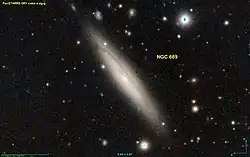| NGC 669 | |
|---|---|
 Pan-STARRS image of NGC 669 | |
| Observation data (J2000 epoch) | |
| Constellation | Triangulum |
| Right ascension | 01h 47m 16.1s[1] |
| Declination | 35° 33′ 48″[1] |
| Redshift | 0.015591[1] |
| Heliocentric radial velocity | 4674 km/s[1] |
| Distance | 200 Mly (60 Mpc)[1] |
| Group or cluster | Abell 262 |
| Apparent magnitude (V) | 13.36[1] |
| Characteristics | |
| Type | Sab[1] |
| Size | ~245,000 ly (75.2 kpc) (estimated)[1] |
| Apparent size (V) | 3.2 x 0.6[1] |
| Other designations | |
| CGCG 522-4, IRAS 01443+3519, MCG 6-5-4, PGC 6560, UGC 1248[1] | |
NGC 669 is an edge-on spiral galaxy[2] with an active galactic nucleus[3] located 200 million light-years away[2] in the constellation Triangulum. NGC 669 was discovered by astronomer Édouard Stephan on November 28, 1883[4] and is a member of Abell 262.[5][6][7][8]
See also
References
- 1 2 3 4 5 6 7 8 9 10 "NASA/IPAC Extragalactic Database". Results for NGC 669. Retrieved 2018-11-16.
- 1 2 "Your NED Search Results". ned.ipac.caltech.edu. Retrieved 2018-11-17.
- ↑ "NGC 0669". Retrieved 2018-11-17.
- ↑ "New General Catalog Objects: NGC 650 - 699". cseligman.com. Retrieved 2018-11-14.
- ↑ P., Fouque; E., Gourgoulhon; P., Chamaraux; G., Paturel (May 1992). "Groups of galaxies within 80 Mpc. II - The catalogue of groups and group members". Astronomy and Astrophysics Supplement Series. 93: 211. Bibcode:1992A&AS...93..211F. ISSN 0365-0138.
- ↑ M., Garcia, A. (July 1993). "General study of group membership. II - Determination of nearby groups". Astronomy and Astrophysics Supplement Series. 100: 47. Bibcode:1993A&AS..100...47G. ISSN 0365-0138.
{{cite journal}}: CS1 maint: multiple names: authors list (link) - ↑ Giuricin, Giuliano; Marinoni, Christian; Ceriani, Lorenzo; Pisani, Armando (November 2000). "Nearby Optical Galaxies: Selection of the Sample and Identification of Groups". The Astrophysical Journal. 543 (1): 178–194. arXiv:astro-ph/0001140. Bibcode:2000ApJ...543..178G. doi:10.1086/317070. ISSN 0004-637X. S2CID 9618325.
- ↑ "Detailed Object Classifications". ned.ipac.caltech.edu. Retrieved 2018-11-17.
External links
- NGC 669 on WikiSky: DSS2, SDSS, GALEX, IRAS, Hydrogen α, X-Ray, Astrophoto, Sky Map, Articles and images
This article is issued from Wikipedia. The text is licensed under Creative Commons - Attribution - Sharealike. Additional terms may apply for the media files.